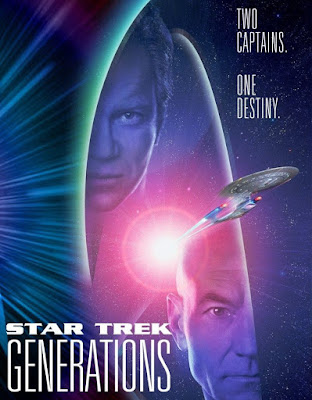Star Trek: Generations (1994)
Dir. David Carson
There's a feeling in Trek fandom that when it comes to the movies the odd numbered entries generally aren't as good as the even numbered ones – at least, up to a point. I don't know if it's a majority feeling or merely a more published one, but for me it rings true. Generations, being film number VII, is an odd numbered entry.
Even though it has Captains James T. Kirk and Jean-Luc Picard in the same film (Oh my!), it's simply not as good as the even numbered features that came immediately before and after it.
It begins in the TOS era (2293), with three of the original cast members doing a kind of royal visit - followed by a news crew, they watch the maiden voyage of the Enterprise-B. Kirk is antsy that he's not in the big chair, but deep down he knows change is inevitable: the torch must be passed.
Passing a torch is what Generations seems to have been designed to do; not to the Enterprise B's Captain Harriman (Alan Ruck), he's a forgettable stopgap in the famous ship's history, but from one defining era of Trek to the next, TOS to TNG, a special gift to fans of both.
When it moves to TNG's era things slow down considerably and the pace-setting of the TOS era evaporates. The plot involves a man with a singular objective who must be stopped and, of course, it falls to the Enterprise crew to stop him, which is all well and good, but the emotional side, exploring family and duty, is handled clumsily and comes across as irritatingly twee.
The man with the aforementioned singular objective is Dr. Tolian Soran, played by Malcolm McDowell, whose portrayal of Alex DeLarge in Stanley Kubrick's A Clockwork Orange (1971) gave him a counterculture edge that bubbles under the surface of almost every antagonist (or antihero) character that he's portrayed since. Soran will stop at nothing to achieve his goal.
- "I've just come to read the warp drive meter!" -
The film needed more of that kind of thing - more subtext with immediacy. Instead, it got more meandering scenes and some unsuccessful period drama-esque musings on loss and regret.
For those of us that have Trek in our hearts, Generations is at best a well-meaning but sometimes boring passing of the torch. Not that TNG actually needed such a gesture, but it's nice to see happen, nonetheless. (Just don't analyse the plot too much or you may end up screaming at the screen.) However, it never feels like a feature film, more like an extended episode with some moody lighting attached, so non-Trek fans might find it even more lacking.
NOTE: I know not everyone agrees on their use, but I've stuck with Roman Numerals in my titling because Generations continues both TOS and TNG continuity. And because I've decided to do it here, it makes sense that I continue to do it with the remainder of the TNG movies, too.
- "I have a very bad feeling about this." -




No comments:
Post a Comment